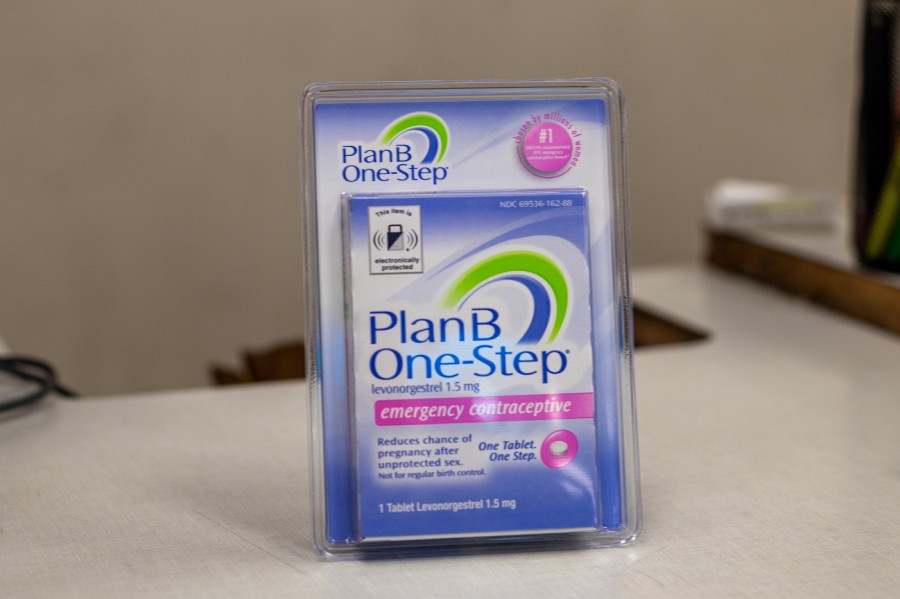Opinion: What if you could get Plan B from a vending machine on campus?
Universities across the country have installed vending machines that sell round-the-clock, contact-free emergency contraception on their campuses. NYU needs to follow suit.
(Manasa Gudavalli for WSN)
February 16, 2023
The George Washington University installed a first-of-its-kind vending machine on its campus last month. Instead of dispensing snacks, energy drinks, or other late-night study fuel though, the machine allowed students to purchase the morning-after pill.
GWU wasn’t the first institution to place a vending machine for emergency contraceptives on its campus — that was Shippensburg University, in Pennsylvania. Other colleges and universities across the country followed suit, including Brandeis University, Pomona College and Stanford University. Even Columbia University, our neighbor uptown, has installed vending machines in the lobbies of two of its residence halls.
The morning-after pill, which many people know as Plan B, is a marvel of modern medicine. It is ubiquitous — approximately one out of four women in the U.S. aged between 15 and 49 have used it. The pill works to prevent pregnancy after sex that was unplanned, unintended, or unwanted, or when contraception fails or is not used. In order to be effective, it must be taken as soon as possible, and typically within 72 hours.
That isn’t a lot of time, and it often takes longer to get the pill because most drugstores do not have the medication available off the shelf — even though it does not require a prescription, a pharmacist dispenses it to you at most New York City pharmacies. For NYU students, another option is to go to the Student Health Center. These options mean that it is much harder than it should be to get the pill outside of normal business hours. New York City has hundreds of 24-hour Walgreens, Duane Reades and CVS Pharmacies, but even those often close their pharmacy counter overnight. Access is important, and NYU can join its peer institutions in making emergency contraception easier to get, 24 hours a day, seven days a week.
Dispensing the pill through vending machines would also give students and employees an easy, stigma-free way to get the pill. Saying the words “Plan B” out loud to a pharmacy employee is often daunting. There have also been countless incidents nationwide in which pharmacists have refused to sell the drug, citing “moral objections.” Nobody should have to be in that situation.
Other than Connecticut, no states have any restrictions on the sale of these products in vending machines. NYU could feasibly — and legally — install them in places like the Student Health Center, residence halls — or even at Bobst Library or another central location. The university already has custom Vengo vending machines, the same kind that other institutions have used to dispense emergency contraceptives.
Student leaders on campus, including Ana Roudebush, the co-chair of the student government’s committee on health and wellness, have expressed their support for providing pills through vending machines, saying that it would reduce stigma and increase accessibility and affordability. Roudebush did express concerns that the absence of a pharmacist or trained professional may prevent important instructional information from being disseminated to users.
“I was sort of concerned about the lag in sex education across the country,” she said. “It’s difficult for a lot of people to know the repercussions that come with taking Plan B multiple times a month, multiple times a year.”
Though some users experience side effects including nausea and irregular menstruation, there are no documented long-term health repercussions of repeated use of the morning-after pill. And there are easy, effective ways for NYU to do its part to make sure everyone purchasing the pill has access to instructions and accurate information — placing pamphlets near the vending machines, creating an instructional video accessible via a QR code, or having a nurse on-call to answer questions over the phone.
The pill retails at approximately $50 at major pharmacies. The NYU Health Center pharmacy sells it to students for the discounted price of $15, and those enrolled in the university’s health insurance can obtain it at no out-of-pocket cost. While this discount is a great step, the university could offer these rates at vending machines to increase accessibility.
By installing these vending machines, NYU would be taking a much-needed step in providing safe and quality healthcare for its student body. In the meantime, know that the pill is available for free, 24/7, at public hospitals in New York City.
WSN’s Opinion section strives to publish ideas worth discussing. The views presented in the Opinion section are solely the views of the writer.
Contact Aksha Mittapalli at [email protected]



























































































































































